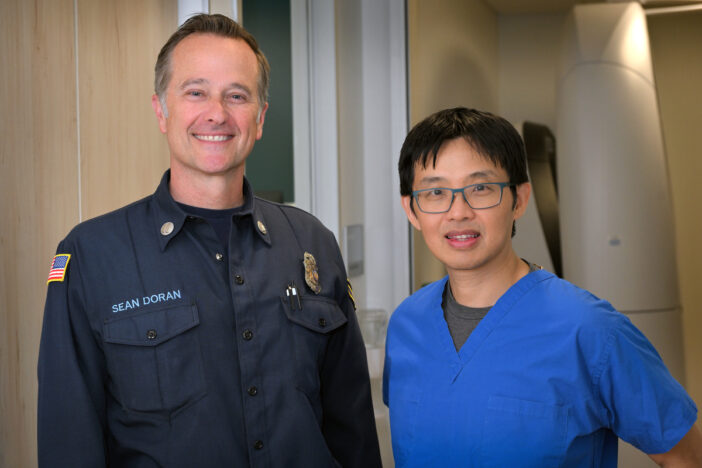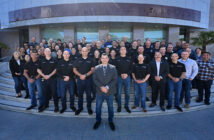We’ve all seen the romanticized pictures on TV shows like “Fire Country” and “Chicago Fire,” and in movies such as “Only the Brave,” and “Backdraft.” Firefighters emerge backlit by a conflagration, their gear blackened from smoke, faces smudged with ash, the char a kind of glorified warpaint.
Whether exposed to soot or other airborne particles floating in the air, firefighters come into contact with an untold number of chemicals, some benign and others carcinogenic.
According to the Journal of the American Medical Association, “epidemiologic studies have found an elevated risk for skin cancer among firefighters.” These include basal and squamous cell carcinomas and melanoma, the most dangerous of the main skin cancers.
For that reason, in conjunction with Skin Cancer Awareness Month and “Melanoma Monday,” an inaugural Save Our Heroes Day, was staged at Hoag Health Center Irvine – Sand Canyon.
Dr. Steven Wang, Director of Dermatologic Oncology at the Hoag Family Cancer Institute, working with the Orange County Professional Firefighters, Local 3631, conducted 55 skin cancer screenings for active and retired firefighters on May 6.

Dr. Steven Wang uses a digital dermatoscope with OC Fire Authority Captain Sean Doran to see lesions underneath the skin that cannot be seen with the naked eye to help him make a diagnosis.
Photo by Steven Georges/Behind the Badge
Wang said the event was held to show appreciation to the firefighters, who are at increased risk, and to encourage screenings.
“The goal is early detection and prompt treatment,” Wang said, adding that with melanoma, if caught early the risk of dying is very low.
While respiratory and other ailments are better known, skin cancer has come under greater scrutiny in the firefighting community.
“We wanted to do something (for skin cancer awareness),” Wang said. “We thought this would be really useful for firefighters. Obviously they are heroes who rush into fires and we wanted to show our appreciation.”
Throughout the day, Wang conducted free examinations, scanning patients for telltale signs.
Jeff Hughes, a retired firefighter and Wellness Agent for the union, thanked Wang for reaching out to the union.
“He really went above and beyond,” Hughes said. “He gave us the whole day. His spots filled up quickly. This is our first skin cancer event.”
Organizers hope that in future years the event can be continued and expanded to get more firefighters involved. At the May 6 event, Wang found pre-skin cancer spots and lesions as well as several early indications of melanoma and affected squamous cells.
Wang said most of the attendees at the event were older, retired firefighters. And while that is important, he would like to get the word out to younger firefighters who may have early exposures and should be screened and educated.
“They are young and fearless and think nothing can touch them,” Wang said. “They don’t really protect themselves.”

Dr. Steven Wang, Program Director of Dermatologic Oncology, left, talks to OC Fire Authority Captain Sean Doran during a free skin cancer screening for local firefighters at the Hoag Health Center in Irvine.
Photo by Steven Georges/Behind the Badge
The changing world of wellness
Wellness and health have become important watch words among first responders.
For Hughes the topic is profoundly personal. He lost his father, Harry Lee Frazier, a Long Beach firefighter who died from brain cancer, in 1982. However, it took 39 years for his father’s death to be recognized as one caused by occupational cancer, and for his name to be added to the The International Association of Fallen Firefighters (IAFF) Memorial in Colorado Springs.
The IAFF lists occupational cancer as the leading cause of line-of-duty deaths. Of the last nine Orange County Fire Authority (OCFA) firefighters added to its Fallen Fighter Relief Fund for those who died in the line of service, seven deaths were from cancer.
Hughes’ world changed after he listened to a speaker at a conference talk about the “firefighter cancer epidemic.”
As Hughes wrote for “Orato: First-Person News,” “When I heard those words—cancer epidemic—it triggered a purpose that has driven me to national involvement in firefighter cancer prevention efforts and research.” Since then, Hughes has been at the forefront of the wellness movement locally and nationally.

Dr. Steven Wang, Director of Dermatologic Oncology, left, shows OC Fire Authority Captain Sean Doran Hoag’s Vectra whole body dermatology 3D imaging system designed to capture the entire skin surface in macro quality resolution.
Photo by Steven Georges/Behind the Badge
He created the Orange County Firefighters Attacking the Cancer Epidemic (FACE) Team. He authored the IAFF resolution in 2018 that created Firefighter Cancer Awareness Month, has written policies and procedures to reduce firefighter illnesses, and sits on advisory boards and committees for cancer study and support groups.
The work of Hughes and other advocates has led to a sea change in how firefighters, agencies, health officials, and lawmakers approach cancer and other wellness issues.
Sean Doran, a fire captain and public information officer for the OCFA, said he has seen big changes to the whole process of scrubbing, changing out gear, and decontamination.
And when it comes to being informed and attending events such as Hoag’s Save Our Heroes, Doran said, “We are actually at a point where we’re getting ahead of the curve and holding ourselves accountable.”
Firefighters are learning that, “Whatever I can control, I need to own that,” he said.
When writing on the subject, Hughes stated, ”There are two things firefighters hate: the way things are done and the thought of change. It is a tough transition, but I know we can do it.”
Wang said firefighters are not alone in being resistant to change.
“Changing behavior is extremely difficult,” he said.

Dr. Steven Wang, Director of Dermatologic Oncology, left, talks to OC Fire Authority Hand Crew Firefighter Martin Wills during a free skin cancer screening for local firefighters at the Hoag Health Center in Irvine.
Photo by Steven Georges/Behind the Badge
May 6 was not the first time Hoag and Local 3631 have teamed up. In October, Hoag Health System, the Grail biotechnology company, and the union offered a two-day cancer screening event. The Galleri test, described by the company as a “first-of-its-kind multi-cancer early detection test,” was administered to more than 200 firefighters at the Local 3631 Union Hall.
Using advanced genomics and machine learning, the Galleri test determines the origin of cancer signals, which can then guide diagnostic workup. Chief Medical Officer James Lindberg of Hoag Corporate Health was thrilled to be able to help avail the first responders to the Galleri test.
“Hoag is committed to helping protect and enhance the lives of the firefighters at OCFA,” Lindberg stated in a press release. “We are excited to add this exciting new technology, in collaboration with Local 3631, to our services.”
The image problem
For firefighters specifically, the mythology and ideal of the hard-bitten warrior is hard to overcome. As the evidence grows about the elevated and growing cancer risks firefighters face in their profession, the grimy warrior is exactly the wrong image to promote, officials say. These days, cleanliness is an important survival tool.
Hughes remembers the days when exhausted firefighters would peel off their dirty gear next to their beds and go to sleep to the smell of smoke and diesel.
“The dirtier your gear was, the better,” he said of the old perception. “You looked more experienced.”
Hughes remembers guiding a senior commander, who was wearing pristine gear, through a fire site.
“He said he was embarrassed how clean his gear was,” Hughes recalled. “I said, ‘That’s exactly what we’re trying to change.’”
As Joe Knitter, a retired fire chief from South Milwaukee, Wisc., said to Public Safety Group, “Clean is the new salty,” referring to the idea that a firefighter whose gear is soot-covered and sweat-soaked, or salty, is an effective firefighter.
Despite the leaps forward in health protection for first responders, there are still too many firefighters being added to the Fire Fighters Memorial due to cancer deaths, Hughes said.
“If we were burying two or three guys a year for anything (such as mechanical or equipment failures) people would want to fix it. … We bury guys every year (due to cancer deaths),” Hughes said.
 Behind the Badge
Behind the Badge




